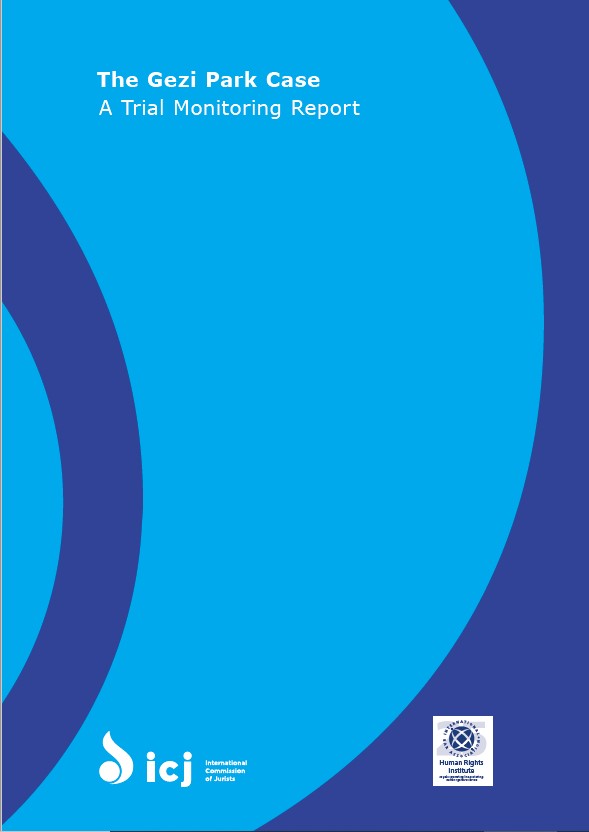In a report published today, the ICJ and the International Bar Association’s Human Rights Institute (IBAHRI) have documented a range of human rights violations in the “Gezi Park” trial, which took place in Istanbul before the 30th Assize Court from 24 June 2019 to 18 February 2020.
Further, the organizations call for the immediate release of Osman Kavala who was acquitted of all Gezi Park trial-related charges, but is in detention, and for all the remaining charges against all defendants to be dropped.
Following the joint trial observation, the ICJ and IBAHRI found that the trial of leading figures in the Gezi Park protests failed to comply with fair trial guarantees under Turkish and international law.
In the re, the organizations concluded that the trial did not meet the requirement of a fair trial under Article 6 of the European Convention on Human Rights (ECHR) and Article 14 of the International Covenant on Civil and Political Rights (ICCPR). Specifically, the proceeding failed to comply with the rights to be tried by an independent and impartial court, the presumption of innocence and to call and cross examine witnesses.
The ICJ and IBAHRI further affirmed that the trial was compromised due to the clear violation of the principle of legality in relation to the criminal law applied, as well as in respect of the grounds for detention, which failed to satisfy articles 9 and 15 of the ICCPR, and articles 5 and 7 of the ECHR.
The Gezi Park protests began in May 2013 as an effort by a group of environmentalists to save a park in central Istanbul from being rezoned, but soon grew into nationwide demonstrations. Police quelled the protests in Taksim Square with the use of tear gas and water cannons.
“While the acquittal of some is welcome, the charges against the defendants were patently baseless and unsubstantiated, and should not have been brought to begin with,” said Massimo Frigo, Senior Legal Adviser of the Europe and Central Asia Programme of the ICJ. “The renewed detention of Osman Kavala under fresh charges related to the same facts as those he is acquitted upon is a deplorable abuse of process and he should be released immediately.”
Baroness Helena Kennedy QC, Director of the International Bar Association’s Human Rights Institute, commented: “Following our extensive trial observation, we are greatly disappointed to see that Osman Kavala will again face trial from 18 December 2020 on new and wholly unsubstantiated charges. Mr Kavala and the Gezi Park protestors should never have been charged, which only makes the failure to uphold fair trial guarantees more disconcerting. Such disregard for due process is sadly now commonplace in Turkey, and we hope this trial report alerts the international community to the true disintegration of the independence of the judiciary and the rule of law in the country.”
The criminal charges brought against the defendants related to offences that are overly broad and prone to unduly restrict the exercise of human rights, notably the freedoms of expression, association and assembly, political participation and privacy.
The defendants in the trial were Mehmet Osman Kavala, Gokçe Yilmaz, Ali Hakan Altinay, Hanzade Hikmet Germiyanoglu, Yigit Aksakoglu, Cigdem Mater Utku, Yigit Ali Ekmekci, Memet Ali Alabora, Handan Meltem Arikan, Can Dundar, Ayse Mucella, Serafettin Can Atalay, Tayfun Kahraman, Inanç Ekmekçi, Mine Ozerden and Ayse Pinar Alabora.
The defendants were charged under the following articles of the Turkish Criminal Code:
- Article 312: an attempt to overthrow the Turkish government or an attempt to prevent it from fulfilling its duties;
- Article 151: damage to property;
- Article 152: qualified damage to property;
- Article 174: possession or exchange of hazardous substances without permission;
- Article 153: damaging places of worship and cemeteries;
- Article 149: qualified robbery;
- Article 86: intentional injury;
- crimes under the Law on Firearms, Knives and Other Tools No 6136; and
- crimes under the Law on Protection of Cultural and Natural Assets No 2863.
The detention of Osman Kavala was declared unlawful under articles 5 and 18 of the ECHR by the European Court of Human Rights during the trial, and the Committee of Ministers of the Council of Europe has called three times for his immediate release despite newly raised charges of espionage.
Download the report:
In English: Turkey-GeziParkTrial-TrialObservation-Publications-Reports-2020-ENG
In Turkish: Turkey-GeziParkTrial-TrialObservation-Publications-reports-2020-TUR
Contact:
Massimo Frigo, Senior Legal Adviser, ICJ Europe and Central Asia Programme, t: +41 79 749 99 49, e: massimo.frigo(a)icj.org

